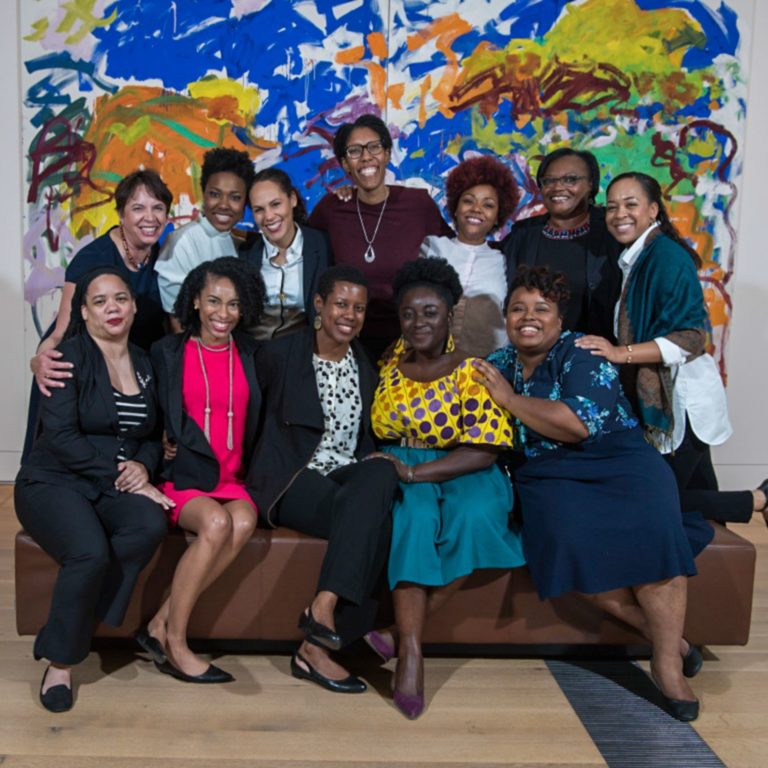This is the first of a series of weekly profiles on Bearden Fellows here at Black Art In America. The Romare Bearden Graduate Museum Fellowship at the Saint Louis Art Museum is nationally renowned as one of the oldest and most robust museum programs in the country dedicated to increasing diversity among professional staff in the museum field. For more information on the Bearden Fellowship, go to slam.org.

Jordia Benjamin
“Art, in the words of Nina Simone, should reflect the times in which we live,” promotes Jordia Benjamin, an art museum educator, community engagement specialist, and college instructor. For over a decade, Benjamin has forged a successful path in the museum and nonprofit sectors both domestically and abroad. The idea, maintains Benjamin, is to “shed light and critique outdated norms to create movements to bring about much needed change. Often, art is the voice of the oppressed looking to sensitize the powers that be on pressing issues affecting communities. The different art mediums must always be agitators for change to facilitate a more just world.”
Benjamin is no stranger to such agitation. As the Mirken Senior Coordinator of Programs and Audience Engagement at the Colby College Museum of Art in Waterville, Maine, Benjamin oversees and advocates for all of the museum’s public programs and community engagement initiatives. Despite the challenges of the past year, the Bahamian native successfully spearheaded the museum’s transition to virtual programming, increasing its audience to over 10,000 viewers. Consistently, Benjamin’s extensive background in museum education—initially forged with the Contemporary Art Museum at the University of South Florida prior to leading the education department at the National Art Gallery of The Bahamas—is a testament to her belief in the critical nature of public engagement work to an organization’s mission, its priorities, its accessibility, and, ultimately, its capacity for change.
In 2014, as a result of her museum work and public engagement advocacy, Benjamin was selected as the 21st Romare Bearden Graduate Minority Fellow at the Saint Louis Art Museum. There, she worked closely with the institution’s Learning and Engagement Department to further develop youth and adult art programming. “The fellowship exceeded all expectations and it challenged me to think outside the normal paradigms of what it means to be truly engaged,” offers Benjamin, clarifying how it deepened her connections with artists, students, curators, educators, and communities as a whole. She points out how such increased exposure to museum culture for people of color can lead to more professionals in the space.
“Museums are to be an accurate reflection of a whole society and not only for a certain segment,” stresses Benjamin, noting “with more inclusiveness, museums can become a vehicle for change. Through education, they could empower, uplift, and provide insights into real, unaddressed problems that historically have plagued communities and societies at large.” Benjamin has continued to use her experience as a Bearden fellow to engage diverse communities and “address their concerns through art. My focus has been to present opportunities for open dialogue. The more transparent a society becomes, the less upheavals they will experience. So, as a museum professional and one who engages communities often, my purpose is to find common ground for the common good through the means of art.”
Given the role and the potential of art in contemporary society, Benjamin drives home its present value. “If ever there was a time for its use, it is now. With pressing issues such as women’s fight for equality, unabated racism, immigration conundrums, global warming, livable wages, lack of affordable health care, and conflicts in different regions of the world, art gives abundant space for expression and resolution.”
Advancing Change: The Future of Museum Leadership
Virtual Summit on Diversity — link to register : https://bit.ly/31Ph8yJ

Past Romare Bearden Fellows, Saint Louis Art Museum




